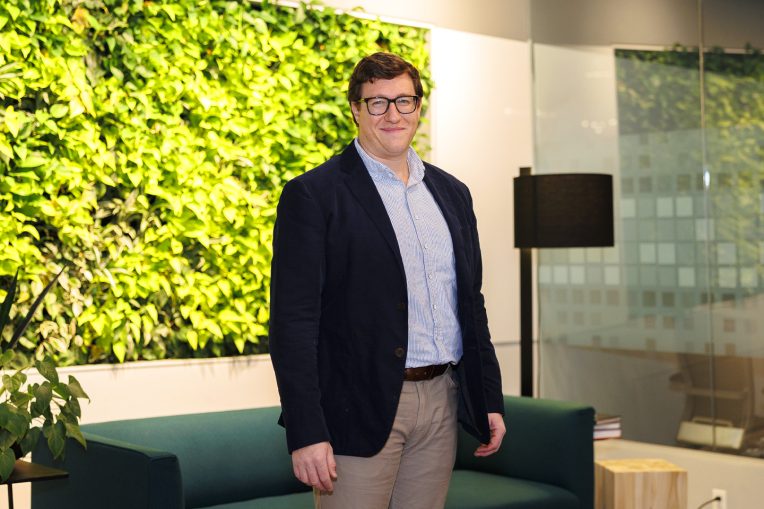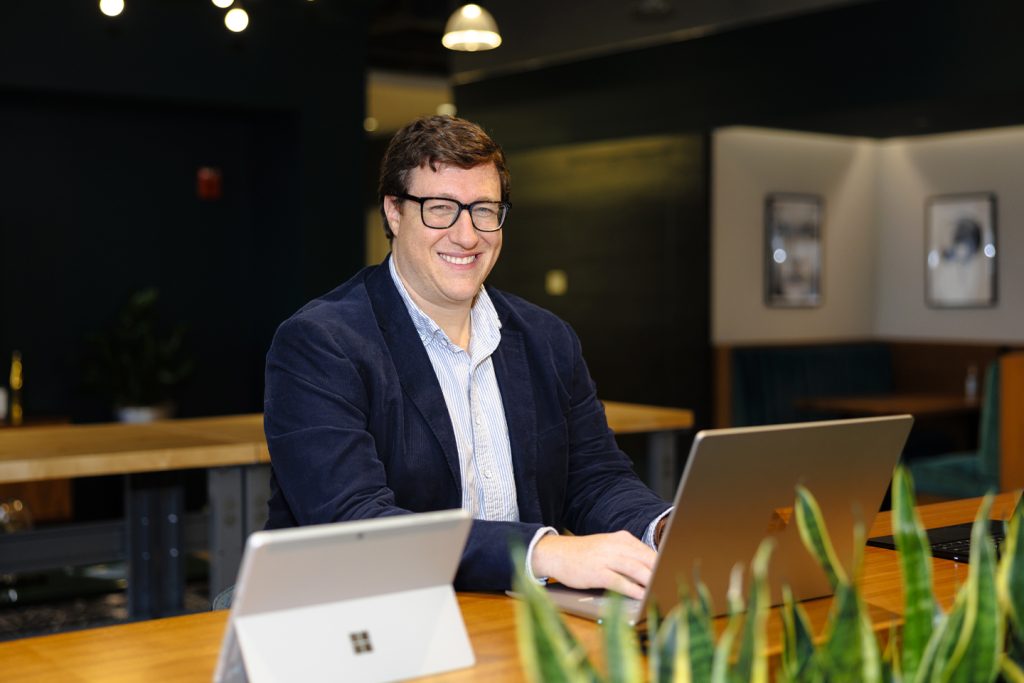One of the key ways citizens can participate in civic engagement is through the shaping of government policy. Tyler Clark ’09 has been trying to impact communities and people’s lives through public service and affairs since he was a student at Illinois State University.
During his undergraduate years, Clark served as the director for external relations and secretary of governmental affairs for the Student Government Association and interned at a lobbying firm in Washington, D.C. He also engaged in community service as a participant in an Alternative Breaks trip to Atlanta.
Since graduating, Clark has gone on to work prominently in state government in Illinois, first as a policy analyst for Republican state senators and later as Gov. Bruce Rauner’s Senate liaison and then as the chief of staff of a nascent state agency of technology and innovation.
“I am a behind-the-scenes guy,” said Clark, a Mahomet native who sits on the Illinois State Alumni Association’s board of directors. “I’ve worked with a lot of politicians, and they can’t be as actionable because they represent such a wide body of people. I get to focus on the things that I’m really interested in, that are aligned to those politicians—and now companies—that have the same value systems and allow me to live that out.”
Clark is currently making a #RedbirdImpact through his role as state and local government affairs industry manager for Microsoft Corp. in Chicago. Among his responsibilities is helping to lead the tech giant’s Accelerate Chicago Program, which aims to close the digital divide by offering Chicagoans technological skills training and jobs programs through partnerships with city government and neighborhood nonprofits.
In the following Q&A, Clark talks about how he became involved in government policy at Illinois State and his career in government affairs.
How did you get involved in civic engagement while you were at Illinois State?
When I came to ISU, I wanted to be a history teacher. I started as a history major, but I’ve always been interested in politics, so I picked up a double-major in political science.
The biggest change happened when I was in the Honors Program. Becky Mentzer, who was the director at that point, helped me think about doing internships. I had a chance to join a program called the Washington Center for Internships and Academic Seminars. Becky helped me get the funding for that the second semester of my sophomore year. I worked in Washington, D.C., for a small lobbying firm and brought that experience back to campus with the Student Government Association (SGA) and local political engagement as well.
What did you learn working with the SGA?
You start to learn how many different voices there are in a conversation and how to really think about bringing consensus. I started to learn how to coordinate and consolidate and think about the things people you represent are telling you, what they care about, and how to bring that into fruition.
Did you know what you wanted to do after graduation?
I didn’t know at all. It was my dad who said you need to have a plan. I ended up applying for University of Illinois Springfield’s Illinois Legislative Staff Intern Program. It’s a one-year program where you go and interview in Springfield to be part of one of the four legislative caucuses. I was able to work for the Senate Republicans, and it was just so much fun working and being a part of state government in that way.
What was so attractive about that?
As a staff member, I was involved in watching policy be made live, and most people don’t get to see that. In some cases, I was actually writing it and helping in that negotiation.
Did you always have this passion around politics?
I wouldn’t say I had a passion for that. No, I think it’s more about government and policy and how you can work to help people’s lives improve.
What did you do after the internship?
When I finished the internship program, I moved to Lake County where I ran a political campaign where we were successful in getting a candidate elected to the state Senate. And that’s where I learned I really didn’t like that part of it. I still did it a couple more times, but it just wasn’t my favorite part of the process.
When I finished that campaign, I was offered a full-time job on the staff. I worked out of our Chicago office, which gave me the opportunity to work with the Senate minority leader (Christine Radogno) a little bit more because she worked out of that office. But I was a policy analyst for almost five years with the Senate, doing revenue, economic development, local government, regulated industries, all kinds of different policy around that. It was really helpful for me to learn how all the parts of state government work.
That was the period right before Gov. Rauner was elected, right?
It was. And that’s where I went next. I joined Gov. Rauner as his Senate liaison. It was great because you’re not working for one side of the aisle or another. You’re representing the governor before the entire Senate, trying to convince people of our agenda, facilitating the governor’s introduction to all of the members of the Illinois Senate and understanding what they wanted, and understanding what their challenges were with the governor.
I was there for two sessions. One of the things we wanted to do was create a separate state agency called the Department of Innovation and Technology. And I’d actually always been very interested in computers. I had my own consulting company building websites for people doing some of that. And the state chief information officer at the time asked for some help in getting this executive order passed with the governor to create a new state agency. And we helped get that done. The chief information officer asked me to join as the first chief of staff so I was able to leave the governor’s Legislative Affairs Office and work for this brand new state agency and actually work to build a state agency while running it.
Did that experience lead into your work with Microsoft?
When I left state government, I went to a small public affairs consulting firm in Chicago, doing strategic communications, crisis communications, legislative and governmental affairs, for a wide range of clients in energy, pharmaceuticals, regulated industries, and also helping technology clients understand how government was thinking about purchasing technology products and how to use those products to solve political and policy challenges.
I joined Microsoft one year ago, in a brand new role where we’re actually helping state and local governments—especially agencies outside of the IT department—think about how to use technology to improve their government operations. As we think of it, how do we increase tech intensity, to make fundamental changes to those government operations to make them better, whether it’s an internal operation or even a citizen-facing operation?
Are there any of these projects that have stood out to you?
We work with governments across the country. I really help to educate governments about the potential for technology and how it can change their operations. I was invited to speak in Pennsylvania for the House State Government Committee which had a hearing on cybersecurity operations, how they should be thinking about cybersecurity to protect the Commonwealth of Pennsylvania. I do those kinds of things to help educate policymakers on how to make government and technology work together.
We launched a program last year in Chicago, called the Accelerate Program, and it’s helping to upskill and reskill 300,000 people in Chicago. And that’s a combination of all kinds of things, such as workforce development challenges, and how do you reach people who may not have connectivity? How do you reach people who may not trust Microsoft as an entity but may trust a community organization? How do you meld all those things together to really bring a story together and help people get those new skills that they need to get a new job or a better job that they want to pursue? That part of my work is really fulfilling as well.
The work that I’m doing is really interesting, and it relates back to when I left ISU and started working in state government in that I do get to have an impact.
What skills did you hone here at Illinois State that you’ve carried on in your career?
Being able to take complex topics and being able to summarize them in a way that a broader audience can understand. And I think the opportunities that I had there in the History Department, and working with individual faculty members, was really helpful to be able to break down complex topics for your audience.
What advice would you give to current Redbirds who may want to pursue a similar career in government?
I think your academic studies are important, but doing things is also really important. Volunteer for a political campaign if that’s what you’re interested in. Try to get an internship in government if you really care about government. I’d also say developing your network while you’re at school and then keep developing that and keep it active.
I always try to think about what other people need to be successful. And I think that’s been a guiding principle for me, and that’s helped me be successful because I am focused on the mission and how you put who you’re working for at the center of things.


